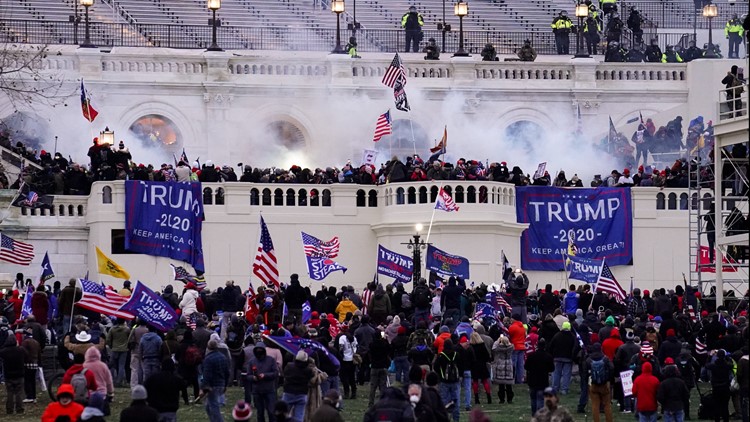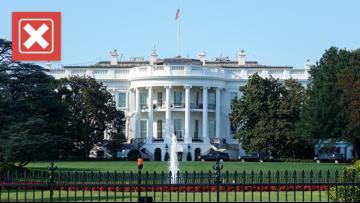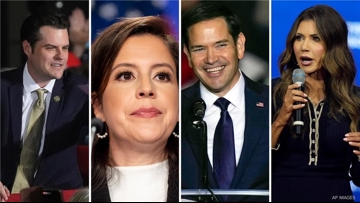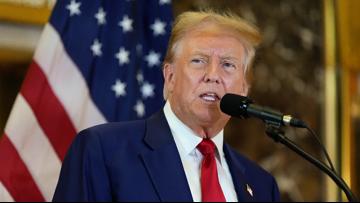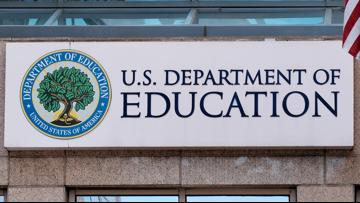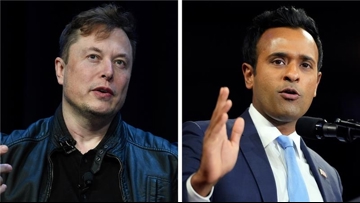Editor's note: On May 25, two members of the Oath Keepers were sentenced to prison. This story has been updated to reflect the jury’s verdict.
After a three-month-long trial, former Proud Boys leader Enrique Tarrio was convicted on Thursday, May 4, of seditious conspiracy for his role in the Jan. 6, 2021 insurrection. He was convicted along with three other Proud Boys members – Ethan Nordean, Joseph Biggs and Zachary Rehl.
Seditious conspiracy is a rarely used Civil War-era charge that can be difficult to prove. The offense calls for up to 20 years in prison.
The May 4 convictions were not the first time someone involved in the insurrection was found guilty of seditious conspiracy. In November, Oath Keepers founder Stewart Rhodes and Kelly Meggs, the leader of the Oath Keepers' Florida Chapter, became the first people in nearly three decades to be found guilty at trial of seditious conspiracy.
A sentencing date has not yet been set for the Proud Boys members. On May 25, Rhodes was sentenced to 18 years in prison and Meggs was sentenced to 12 years.
Below, VERIFY defines key terms from Jan. 6.
THE SOURCES
- Southern Poverty Law Center (SPLC)
- The Anti-Defamation League (ADL)
- Encyclopedia Britannica
- Center for Strategic and International Studies (CSIS), a think tank based in Washington, D.C.
- The United States Department of Justice
- United States House of Representatives
- Brennan Center for Justice, a nonprofit law and public policy institute
- The Law Dictionary
- U.S. Code
QUESTION #1
Who are the Proud Boys?
WHAT WE FOUND
The Proud Boys, founded in New York City in 2016, are designated as a hate group by the Southern Poverty Law Center (SPLC). The nonprofit defines a hate group as “an organization or collection of individuals that – based on its official statements or principles, the statements of its leaders, or its activities – has beliefs or practices that attack or malign an entire class of people,” typically for characteristics such as race, religion, ethnicity, sexual orientation or gender identity.
There are 119 active Proud Boys chapters across 46 U.S. states, the Anti-Defamation League (ADL) says.
The Proud Boys are primarily associated with misogynistic, Islamophobic, transphobic and anti-immigration rhetoric, according to the ADL. Some of its members also back “white supremacist and antisemitic ideologies,” and engage with these types of groups. Proud Boys members often wear black and yellow polo shirts or other types of clothing with the same colors, and tactical vests.
The group has denied connections to the alt-right, but describes itself as a “pro-Western fraternal organization for men who refuse to apologize for creating the modern world, aka Western Chauvinists,” according to court documents cited by the U.S. Department of Justice (DOJ).
VICE Media co-founder Gavin McInnes established the Proud Boys during the 2016 presidential election of former President Donald Trump, according to the SPLC. During a debate with current President Joe Biden in 2020, Trump did not denounce white supremacists and told the Proud Boys to “stand back and stand by,” a comment that sparked outrage from some people.
Though a 2018 internal affairs report from a sheriff’s office in Oregon said the FBI labeled the Proud Boys an “extremist group,” the federal agency refuted this statement and said it doesn’t designate groups in that way.
Five members of the Proud Boys, including the group’s former national chairman Henry “Enrique” Tarrio, have been charged in federal court with seditious conspiracy for their actions before and during the breach of the U.S. Capitol on Jan. 6, 2021.
According to the DOJ, the members “directed, mobilized and led members of the crowd onto the Capitol grounds and into the Capitol, leading to dismantling of metal barricades, destruction of property, breaching of the Capitol building, and assaults on law enforcement.”
Proud Boys members have been connected with other gatherings where extremist groups were present, including the white nationalist “Unite the Right” rally that took place in Charlottesville, Virginia, in 2017. A car plowed into a crowd of people who were peacefully protesting the rally, killing one person and injuring more than a dozen others.
Since the summer of 2018, Proud Boys members have also been involved in violent clashes with anti-fascist organizers in Portland, Oregon.
RELATED: No, the Capitol is not 'public property' and visitors are not guaranteed unrestricted access
QUESTION #2
Who are the Oath Keepers?
WHAT WE FOUND
The Oath Keepers is an antigovernment organization founded in Las Vegas in 2009, according to the SPLC. The Center for Strategic and International Studies (CSIS) says the organization is “committed to supporting and defending their interpretation of the U.S. Constitution against all enemies, both foreign and domestic.”
The group also has a list of “10 Orders We Will Not Obey,” a list of perceived threats from the federal government that include orders to “disarm the American people,” warrantless searches, and orders to impose martial law or a “state of emergency,” among others, according to CSIS. This is part of the group’s belief in a popular conspiracy theory that the federal government plans to push the country into a one-world socialistic government known as the “New World Order.”
According to the SPLC, Oath Keepers members have participated in “multiple armed standoffs” against the government.
From 2016 through 2020, members kept watch at various polling locations and at the site of the “Unite the Right” rally in Charlottesville. They also provided security for events and people promoting “Stop the Steal,” an attempt to overturn the 2020 presidential election, and business owners who defied COVID-19 public health measures, the SPLC says.
In early May, a regional leader of the Oath Keepers pleaded guilty to seditious conspiracy and obstruction of an official related to his actions tied to the Capitol insurrection. William Todd Wilson, a 45-year-old man from North Carolina, was the third Oath Keepers member to plead guilty to the same charges, the DOJ said.
Wilson admitted in his guilty plea that he agreed with others to take part in a plan to “use force to prevent, hinder and delay the execution” of the transfer of presidential power.
“He and others used encrypted and private communications, equipped themselves with a variety of weapons, donned combat and tactical gear and were prepared to answer a call to take up arms,” according to the DOJ.
QUESTION #3
What is sedition?
WHAT WE FOUND
Members of both the Proud Boys and Oath Keepers are charged with seditious conspiracy.
Encyclopedia Britannica defines “sedition” in simple terms as a “crime against the state.” Sedition differs from treason in that it consists of “inciting rebellion or violence against the government,” rather than “acts against the United States government,” The Law Dictionary explains.
Treason is defined in Merriam-Webster Dictionary as “the offense of attempting by overt acts to overthrow the government of the state to which the offender owes allegiance or to kill or personally injure the sovereign or the sovereign's family.”
The full legal definition of “seditious conspiracy” according to U.S. code is as follows:
“If two or more persons in any State or Territory, or in any place subject to the jurisdiction of the United States, conspire to overthrow, put down, or to destroy by force the Government of the United States, or to levy war against them, or to oppose by force the authority thereof, or by force to prevent, hinder, or delay the execution of any law of the United States, or by force to seize, take, or possess any property of the United States contrary to the authority thereof, they shall each be fined under this title or imprisoned not more than twenty years, or both.”
QUESTION #4
What is an insurrection?
WHAT WE FOUND
An insurrection is defined by Encyclopedia Britannica as an “organized and usually violent act of revolt or rebellion against an established government.”
Federal law prohibits insurrection, with anyone who “incites, assists or engages in any rebellion or insurrection against the United States” facing up to 10 years in prison.
The Insurrection Act of 1807 authorizes the U.S. president to “deploy military forces to suppress rebellion or domestic violence or to enforce the law in certain situations,” according to the Brennan Center for Justice. This doesn’t give the president authority to declare martial law, which allows the military to take over for the civilian government.
It has been invoked numerous times throughout U.S. history, including by President Abraham Lincoln at the start of the Civil War and other presidents to intervene in labor disputes.
According to the Brennan Center, the act was last invoked in 1992, when California’s government requested military aid from President George H.W. Bush in response to unrest in Los Angeles following the acquittal of four white police officers who were charged with beating Black driver Rodney King. The federal government at the time did not invoke the act in response to the attack at the Capitol on Jan. 6, 2021, the Associated Press reported. Many media outlets, including the AP, at the time referred to the attack as an insurrection and still do today.
The Associated Press contributed to this report.

